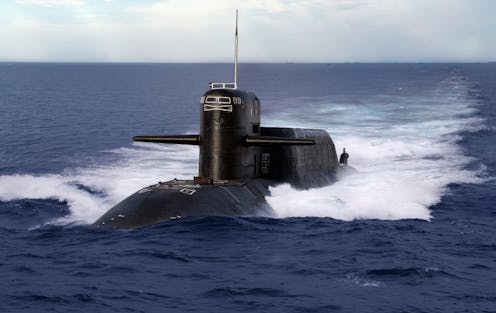The AUKUS submarine deal has been exposed as a monumental folly – is it time to abandon ship?
- Written by The Conversation

Nautical metaphors are irresistible, I’m afraid, when talking about Australia’s seemingly endless submarine saga. But as investigative journalist Andrew Fowler makes clear in Nuked: The Submarine Fiasco that Sank Australia’s Sovereignty, his excellent and excoriating analysis of the genesis of the AUKUS pact, there isn’t much room for levity otherwise.
Anyone who doubts the accuracy of former Labor luminaries Paul Keating and Gareth Evans, who have argued that AUKUS is, as Keating put it, “the worst deal in all history”, really ought to read this book.
Review: Nuked: The Submarine Fiasco that Sank Australia’s Sovereignty – Andrew Fowler (Melbourne University Publishing)
The plan for Australia to acquire eight nuclear-powered submarines, built locally in partnership with the United Stated and the United Kingdom, is projected to cost up to A$368 billion. But it is not just the cost of the AUKUS project that is astounding.
While many people should hang their heads in shame, the principal architect of this monumental folly is Scott Morrison, whose reputation will be deservedly further diminished by the revelations contained in Fowler’s carefully researched volume. One question the book does not address in detail is the abysmal quality of political leadership in this country, especially, though not exclusively, on the conservative side of politics.
Whatever the reasons for this, the end result was that
the huge shift in Australia’s foreign policy alignment was hatched by a Christian fundamentalist former tourism marketing manager with no training in strategic or foreign affairs but a great gift for secrecy and deception.
The shift in question was the decision to abandon an agreement to buy much cheaper, arguably far more suitable and deliverable submarines from France, with the aim of “welding Australia’s military to the United States”. In retrospect, it is hard to believe how badly the French were misled, or how shortsighted the rationale for the switch actually was.
In Fowler’s view, buying the French submarines would have been a “remarkable achievement”. It would have given Australia “greater independence and a more influential position in the world”.
Properly explaining Australian policymakers’ fear of strategic and foreign policy independence would take another book. But what clearly emerges from Fowler’s account is how irresponsible and self-serving Australia’s approach to national security became under Morrison. The fate of the Australian people, not to mention the endlessly invoked “national interest”, was of less concern than short-term political advantage.
“The fact that the increasing US military presence in the Indo-Pacific could draw Australia into a conflict,” writes Fowler, “seemed of little consequence in Morrison’s desire to wedge Labour on national security.”
Of course, being painted as “weak” on security, and the US alliance in particular, was the stuff of nightmares for the Australian Labor Party. It still is. Consequently, the ALP’s leadership has gone to extraordinary lengths to try and convince voters, and its own increasingly sceptical rank and file, that not only are they equally committed to national security, but that the AUKUS agreement is the best way of achieving it.
High costs, significant risks
Given AUKUS was the brainchild of a discredited conservative prime minster who, Fowler suggests, “believed he was on a divine mission”, one might have hoped the Albanese government could have at least conducted a perfunctory cost–benefit analysis. AUKUS is the largest single military acquisition the nation has ever undertaken, after all. Recent defence acquisitions have become known for massive cost blowouts and failures to operate or arrive in the advertised manner.
But the Labor Party has not only walked into Morrison’s trap; it has willingly, even enthusiastically, “embraced a decision taken after a deeply flawed process”. Even more consequentially, as Fowler points out, “with the major parties in lockstep on AUKUS, the most complex and expensive spend in Australian military history would never be publicly investigated”.
At the very least, this is an astounding failure of good governance and accountability. Perhaps even more remarkably, it also demonstrates a singular lack of political judgement, driven by short-term political concerns rather than long-term strategic interests.
“Labor lost the one chance it had to identify itself as independent and courageous and put the interests of the country ahead of its understandable desire to win government,” argues Fowler. “The consequences of the fear that drove the ALP leadership to embrace AUKUS with barely a second thought will haunt them for years to come.”
Serves them right. When there is little discernible difference between the major political parties on issues of profound national importance, voters – especially the younger variety – may understandably despair about their futures.
Even if we put aside the fragile, unpredictable and polarised nature of US politics, it is not too controversial to suggest that the US alliance has some potential frailties and significant costs. Not the least of these is fighting in wars that have no obvious strategic relevance to Australia.







